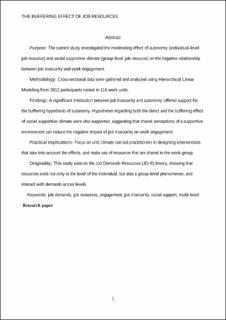A multilevel model of job insecurity and engagement
Journal article, Peer reviewed
Accepted version
Permanent lenke
https://hdl.handle.net/11250/2762823Utgivelsesdato
2020Metadata
Vis full innførselSamlinger
Originalversjon
Journal of Managerial Psychology. 2020, 35 (7-8), 529-541. https://doi.org/10.1108/JMP-02-2020-0089Sammendrag
Purpose
The purpose of this current study was to investigate the moderating effect of autonomy (individual-level job resource) and social supportive climate (group-level job resource) on the negative relationship between job insecurity and work engagement.
Design/methodology/approach
Cross-sectional data were gathered and analyzed using hierarchical linear modeling from 3,812 participants nested in 116 work units.
Findings
A significant interaction between job insecurity and autonomy offered support for the buffering hypothesis of autonomy. Hypotheses regarding both the direct and the buffering effect of social supportive climate were also supported, suggesting that shared perceptions of a supportive environment can reduce the negative impact of job insecurity on work engagement.
Practical implications
Focus on unit climate can aid practitioners in designing interventions that take into account the effects, and make use of resources that are shared in the work-group.
Originality/value
This study extends the job demands-resources theory, showing that resources exist not only at the level of the individual but also a group-level phenomenon, and interact with demands across levels.
